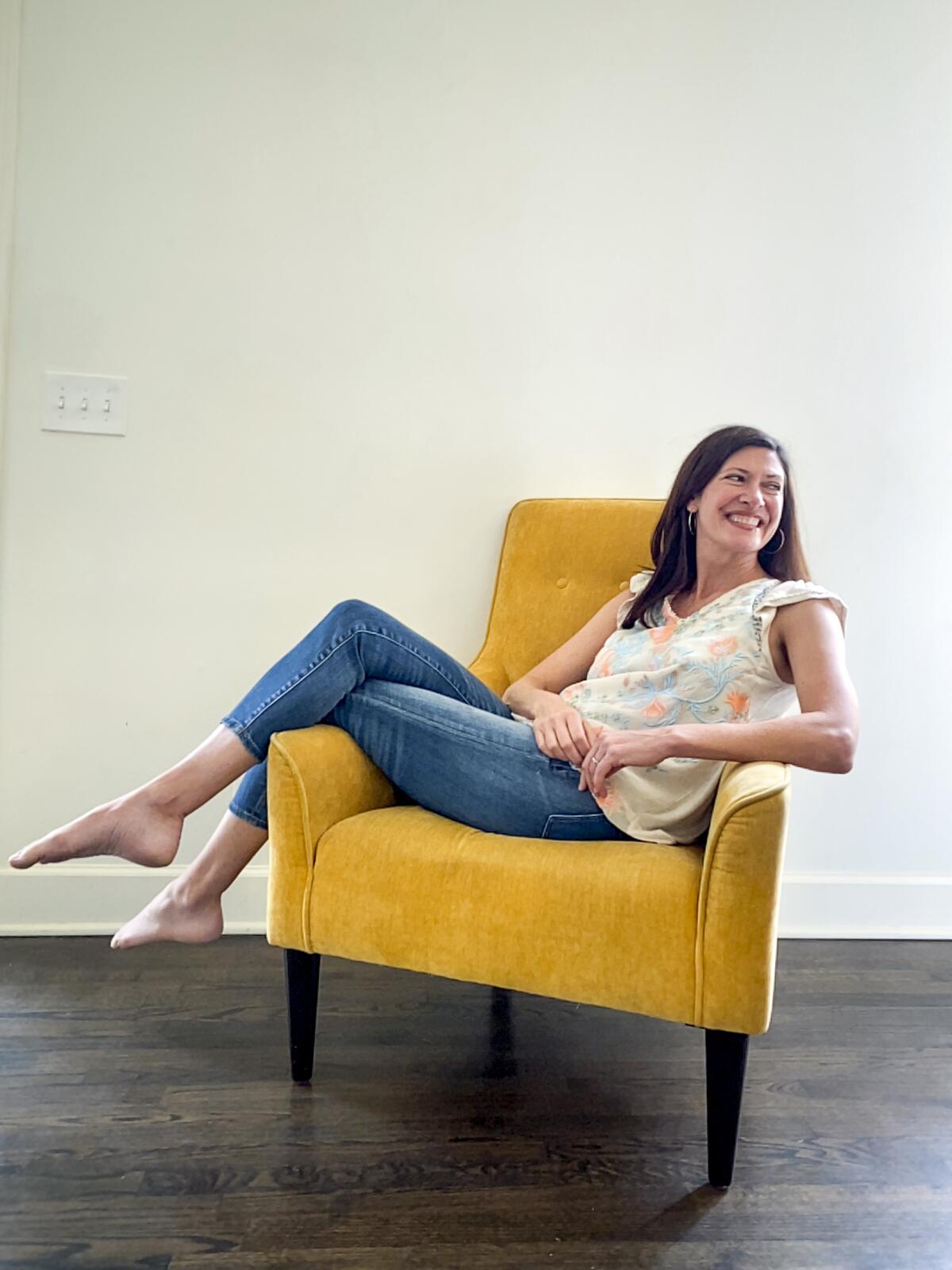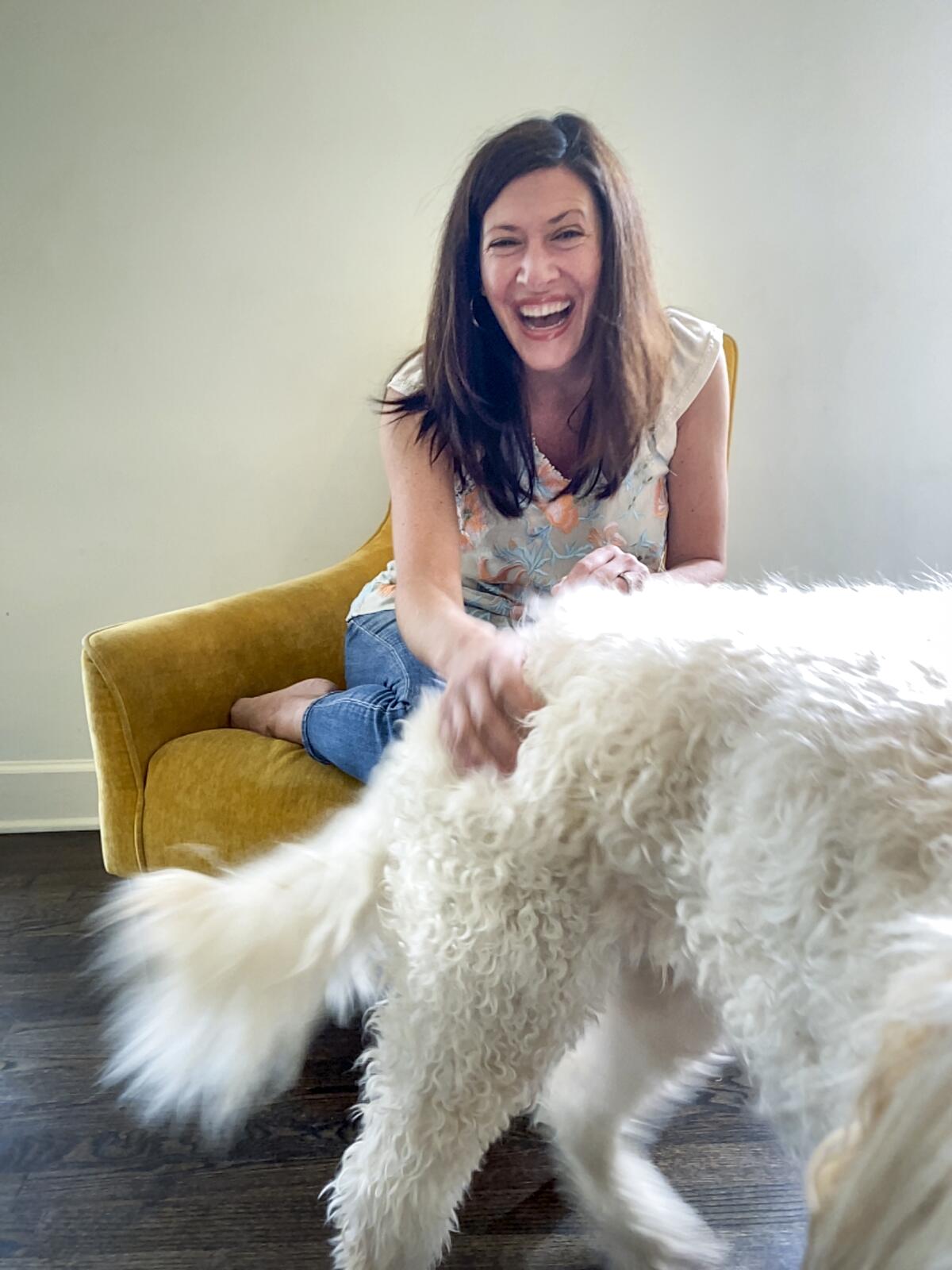‘The Real World’ made ‘Julie from Alabama’ a star. The spotlight wasn’t what she hoped

- Share via
In December 1991, Julie Gentry was driving home for Christmas break after a semester of college. She had just reached the city limits of Birmingham, Ala. and was flipping over a cassette tape in the car stereo when she heard an ad on the radio announcing a casting call for a new MTV series.
Gentry, then an aspiring dancer a few weeks shy of her 19th birthday, showed up the next day and pitched herself as a different kind of Southerner than people were used to seeing on TV. She even showed off her clogging skills.
“It really made an impression,” says Gentry.
Apparently so. Gentry (née Oliver) was cast in the inaugural season of “The Real World,” which as anyone over 35 can readily recite, told “the true story of seven strangers picked to live in a loft and have their lives taped.”
The groundbreaking reality series altered the course of television history and, arguably, American politics, by proving that unscripted programming could make for gripping and lucrative entertainment with a profound cultural impact.
And Gentry’s spur-of-the-moment decision would turn her into one of the earliest examples of a now-ubiquitous breed of celebrity — the reality star — well before there was a roadmap for this type of fame.
After nearly 30 years, Gentry has reunited with her cast mates in “The Real World Homecoming: New York,” a six-episode series for the newly launched Paramount+ streaming service. For many nostalgic Gen X-ers, the news is as exciting as a “Friends” reunion, and “Julie from Alabama” is their Rachel Green.
Gentry never anticipated any of it.
Her motivation for participating in the original series — pitched simply as a documentary about young artists — was modest: “Somebody is gonna pay to move me to New York? I get three months of free rent? This is really working out!” Gentry remembers thinking.
She is speaking via video call from her home near Birmingham, which she shares with her husband, Joshua, a restaurateur, and two teenagers. Now 48, she looks hardly any different than she did at 19, though she has traded the pleated Gap khakis for streamlined denim.
Gentry might have had low expectations going into “The Real World,” but she became the de facto protagonist of the first season: The pilot episode follows her as she travels from Alabama, arrives at the Soho loft and meets her roommates, who include a model, a poet, a rapper, a painter and two musicians.
Jonathan Murray, who created “The Real World” with Mary-Ellis Bunim, saw Gentry — the youngest in the loft and the only one new to the city — as “the stand-in for all those kids who are watching the show all over the country.”
“When you’re telling a story, you want to enter the world through someone’s eyes who hasn’t seen the world before,” says Murray, who was inspired by the PBS docuseries “An American Family,” Michael Apted’s “Up” films and youth-oriented nighttime soaps like “Beverly Hills 90210.” “Julie was representative of a lot of young people who had not been to New York, who had not had that experience to live with lots of different kinds of people.”
Gentry was “a producer’s dream,” he adds. “She really threw herself into getting to know her fellow cast members and soaking up anything she could about that experience.”
Gentry suggests there were more practical reasons she was featured so heavily in the series: She was just at home more often. “You’ve got to make a story out of the footage that you have,” she says, shrugging.
She formed an especially close bond with two of her roommates, Heather B. Gardner, a hip-hop musician and now radio host, and Norman Korpi, an artist who also happened to be gay (though he was described as “bisexual” on the show) — one of the first real-life LGBTQ people on mainstream American television.
“Our ‘Three’s Company’ dynamic is really unique,” says Gardner, who lived with Gentry for a time after “The Real World” ended and was the maid of honor in her wedding. “Julie was around the loft a lot, and we had a chance to talk, and she was just into stuff. She would say ‘What are you doing, and what’s going on?’ And I remember telling her, ‘Yo, this girl Mary J. Blige, she’s going to blow up!’”
At the time she made “The Real World,” Gentry was a virgin, something frequently discussed on the show. She says she was uncomfortable with the focus on her romantic inexperience: “I am not sure I would advise any young person — or older person — to put that sort of delicate and personal information in someone else’s hands.”
But Gentry was also savvy enough to realize that producers were hoping she and roommate Eric Nies, a model who later hosted “The Grind” on MTV, might spark a romance. “If we started to talk and get really close to one another, the cameras would go ‘whoosh,’” she says, making the sound of a zooming camera. “We liked watching everybody jump when we would do that, but there was never anything between us.”
In later years “The Real World” became more associated with hot tub debauchery, but the early seasons balanced youthful antics with weightier social issues. The first season was filmed from February to May 1992, against the backdrop of the Rodney King beating, the L.A. riots and a presidential campaign marked by culture war skirmishes. Over the course of the season, Gentry befriends a homeless woman named Darlene and attends an abortion rights demonstration.
America’s first family of reality TV will end ‘Keeping Up With the Kardashians’ in 2021. But the subgenre known as ‘celebreality’ has been waning for years.
Race was a prevalent theme throughout the 13-episode run. And Gentry, open-minded but also unaware of her own biases at the time, was often at the center of these discussions.
Minutes into the premiere episode, Gentry asks Gardner, who is Black, why she has a beeper. “Do you sell drugs?” (Gentry now describes the comment as “a poor attempt at humor. I never actually thought Heather was a drug dealer.”)
In perhaps the most memorable moment of the season, Gentry and her roommate, writer Kevin Powell, have a disagreement over use of the telephone that erupts into a heated discussion of racism and white privilege that feels like it could have happened in 2021. While in quarantine before production of “Homecoming” began in mid-January, Gentry reluctantly rewatched her season for the first time since it originally aired. She says was bothered by some of the things she said to Powell .
“I remember being upset and not really having the words to say, ‘I’m trying to figure this out, and I just want to be judged for who I am.’ I didn’t know enough to understand there’s a lot more at work here,” Gentry recalls of their fight. “I was glad that I got to come back as a 48-year-old and say, ‘You know, I was pretty naive.’”
On returning to the original loft, the conversations continued, not always to the point of resolution:“Again, we don’t all agree 100% on everything. But I think the seven of us are OK with that,” Gentry says.
But in the aftermath of the insurrection at the Capitol on Jan. 6., the violent last gasp of a racially divisive, reality-TV presidency, aspects of the original series made Gentry uncomfortable — like B-roll of a Confederate flag that shows up less than a minute into the first episode, immediately after she says, “Hi, I’m Julie, and I’m from Birmingham.”
“Would they really feel great putting that in there today?” she wonders. “You didn’t find that flag at my house.”
After “The Real World” wrapped in 1992, Gentry stayed in New York to pursue dancing but found that her visibility made it harder to land gigs. It was especially frustrating when she’d get asked for her autograph after being rejected.
She also did a stint on the West Coast, living with Korpi — who “always has the best real estate,” she says — around the corner from Norman Lear in Pacific Palisades. She took classes at the Groundlings and waited tables hoping for another showbiz break. But years before Kim Kardashian, there was no blueprint for monetizing reality TV notoriety, even as “The Real World” aired in seemingly perpetual marathons and continued to reap millions for MTV.
For ‘The Bachelorette’ and ‘Big Brother,’ two series with fraught histories around race, meaningful treatment of the subject has been a challenge.

“It’s no secret we weren’t paid a lot of money,” says Korpi, who directed Gentry in a spoof movie called “The Wedding Video.” “We bonded because we know that no one else can get what we went through and how we watched society change around us.”
A low point for Gentry came when she was turned down for a role as an exterminator in an Orkin commercial because, as she recalls, “‘Julie from ‘The Real World’ cannot be here to spray for bugs.’”
When her now-husband — a church friend she’d known since she was 15 and started dating during a trip home for the holidays— sent her an exquisite homemade birthday cake overnight, she took it as a sign.
“Norman was like, ‘No one in Los Angeles is gonna do this for you,’” says Gentry. “And I just started feeling like, am I gonna stay in Los Angeles and keep auditioning to be the girl next door on a sitcom when I’ve already been the girl on a sitcom, basically? I just couldn’t figure out what I was pursuing.”
Since returning to Birmingham, she has raised two kids and worked as a community gardener and outdoor education coordinator. She and Gardner are in constant contact. She regularly sees Korpi and roommate Andre Comeau during visits to L.A. And all seven cast members stay in touch via a group text.
They sometimes commiserate about the unintended ripple effects of their little “documentary about artists.” Gentry says Comeau joked that they should record a public service announcement apologizing for Trump: “This isn’t our fault!”
And even though Gentry has maintained a low profile post-”Real World,” her notoriety has lingered. When her son was in the first grade, he came home from school crying and confused because classmates had been taunting him: “My mom says your mom was on TV!”
Gentry’s son is now 19 — the same age she was when she moved into the loft — and lives with a diverse group of roommates in Atlanta. Her daughter, 17, has gone through youth leadership training at the Birmingham Civil Rights Institute. “From a very young age she would tell me, ‘I hate learning the history of this city. What are we doing here?’” says Gentry.
Still, a husband, two kids and a few careers later, Gentry has held onto the inquisitive spirit that made “Julie from Alabama” an MTV star in the era of Madonna and Kurt Cobain, when the network was at the height of its influence.
“People often say, ‘Well, how did “The Real World” change you?’” Gentry says. “I don’t know that it changed me, but it inspired me to keep searching these experiences out and to keep looking for people different from myself.”
‘The Real World Homecoming: New York’
Where: Paramount+
When: Any time
Rated: TV-MA (may be unsuitable for children under the age of 17 with an advisory for coarse language)
More to Read
The complete guide to home viewing
Get Screen Gab for everything about the TV shows and streaming movies everyone’s talking about.
You may occasionally receive promotional content from the Los Angeles Times.






